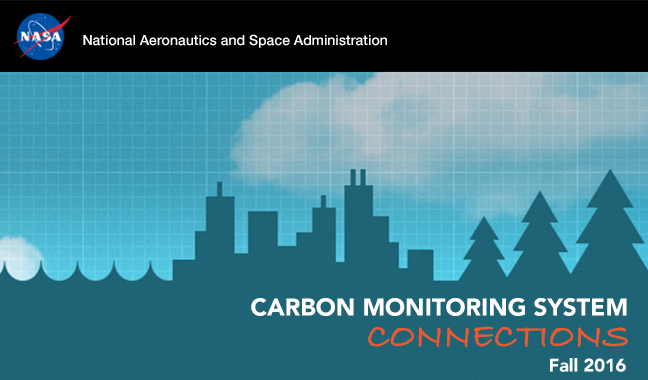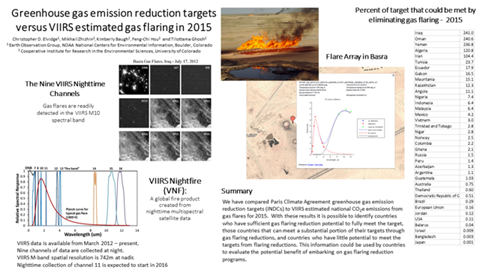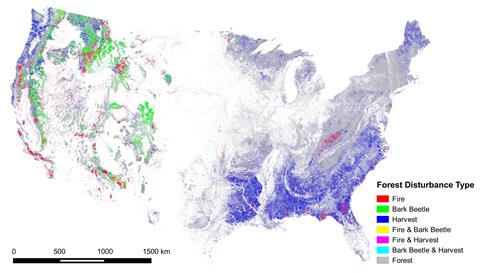Science Team Lead Update
Congratulations to the 15 new projects that were selected to join NASA CMS. These projects cover a range of activities from greenhouse gas inventories to forest biomass monitoring. These new projects will add to the breadth of MRV capabilities and continue to connect stakeholders with carbon data products. During the upcoming NASA CMS Science Team Meeting, all the new projects will give a short presentation highlighting their major goals and plans.
Featured Headlines
CMS Stakeholder
Lunch Time Policy Speaker Series Highlights
Guest Speaker: Phil DeCola, Chief Science Officer, Sigma Space Corporation
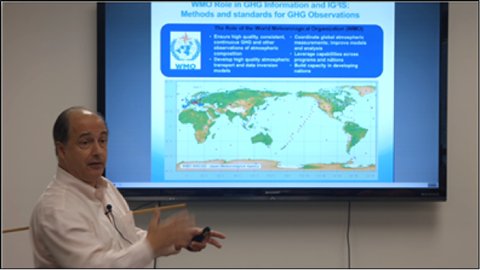
The CMS Policy Speaker Series brings together end users of carbon data, carbon policy stakeholders and decision-makers into a forum that addressed existing and future carbon data needs. The goal of the series it to help bridge CMS science with stakeholder needs, inform CMS PIs of specific end user opportunities and provide new avenues to improve and develop CMS science.
On September 22, 2016 the CMS Applications Policy Speaker Series hosted Phil DeCola, Chief Science Officer of Sigma Space Corporation at NASA's Goddard Space Flight Center for a talk entitled "Progress toward an Integrated Global GHG Information System (IG3IS)". The presentation surveys a new initiative from the World Meteorological Organization that looks to support the success of the Paris Agreement through an improvement of the GHG measurements and the consistency of methods and standards throughout all nations. DeCola's talk identified areas of opportunity where the CMS science community could contribute data into the WMO Initiative, to include GHG monitoring in large urban source areas, and the detection and quantification of large unknown methane emissions.
You may access the slides and recording for this talk and past speakers by visiting the CMS Policy Speaker link.
Project Highlights
Tri-State Area Applications Workshop & Tutorial
CMS Application workshops and tutorials provide an opportunity for CMS Science Team members and stakeholders to engage on thematically detail objectives that help advance CMS science into appropriately scaled policy arenas. On September 9, 2016, the CMS Applications Team working in partnership with the Hurtt-03 CMS project, hosted a workshop with stakeholders from the tri-state area of Maryland, Delaware and Pennsylvania. The workshop was held at the USDA Forest Service Northern Research Station in Newtown Square, PA. Collaborators for this workshop included the University of Maryland and the USDA Forest Service. The goal of the event was to understand the stakeholders needs for carbon monitoring and measurement, reporting and verification (MRV) for MD, DE and PA and find ways of applying the CMS Lidar products to the appropriate areas of each State's Department of Natural Resources (DNR).
The Applications Workshop & Tutorial discussed the uses and applications of new CMS data products available for the tri-state area stakeholders, and assessed results and lessons learned from the agencies and organizations using the data. The CMS scientists learned about the climate change landscape policies and the mitigation targets for each respective state. Current approaches to forest carbon MRV practices were presented by each state representative in an effort to help provide perspective to the CMS scientists. The workshop also discussed the added value and extended benefits of LiDAR data for the states agencies and counties. Some of the stakeholders engaged included: Pennsylvania Department of Conservation and Natural Resources (DCNR), Pennsylvania Bureau of Forestry, Delaware Department of Natural Resources and Environmental Conservation (DNREC) Division of Energy and Climate, Delaware National Estuarine Research Reserve, Delaware Geological Survey, Maryland Department of Natural Resources, Maryland Forest Service, USDA Forest Service, City of Baltimore, Pinchot Institute, Versar, amongst others.
The CMS projects involved in this effort include Escobar-01, Dubayah-03, Hurtt-03. This Hurtt-03 project builds off the earlier Dubayah-03 project and uses airborne lidar retrievals to develop aboveground biomass maps, 1m canopy height and forest/non-forest maps, and 1m land cover maps for the tri-state area of MD, DE, and PA. The CMS Applications Effort (Escobar-01) is assisting Dubayah and Hurtt in the engagement efforts with the state agencies, counties and cities to translate the needs of each state's DNR for carbon monitoring and MRV.
Results from the workshop include:
- Identification of large and important synergies between advances in carbon monitoring and stakeholder needs for carbon monitoring in region.
- Recognition of opportunity to cooperate and develop a shared, consistent, approach to carbon MRV for the tri-state area.
- Discussion of differences between states in terms of specific policy drivers, resources, timeline, needs, opportunities, etc.
- Creation of a Tri-State Working Group consisting of scientists and stakeholders to discuss, share, plan, support, and encourage the development and use of relevant data products to meet stakeholder needs for carbon monitoring (MRV) in the region.
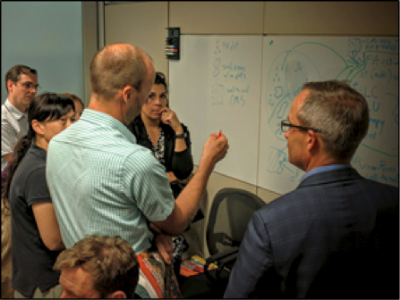
For questions on the CMS Applications effort please contact CMS Applications PI, Vanessa Escobar @ Vanessa.escobar@nasa.gov. To keep up to date of CMS Applications Events please visit the CMS Calendar at http://carbon.nasa.gov/calendar.html, or subscribe to the NASA CMS Applications mailing list by sending an email to edil.sepulvedacarlo@nasa.gov.
Featured Pubs
September Feature
Greenhouse gas emission reduction targets versus VIIRS estimated gas flaring in 2015
With these results it is possible to identify countries who have sufficient gas flaring reduction potential to fully meet the target, those countries that can meet a substantial portion of their targets through gas flaring reductions, and countries who have little potential to meet the targets from flaring reductions.
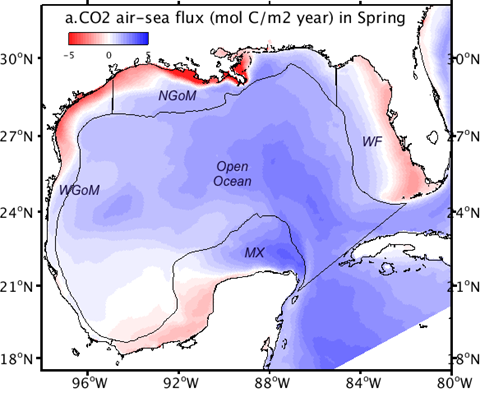
August Feature
Modeling pCO2 variability in the Gulf of Mexico
The findings highlight the role of biological uptake as an important driver for the CO2 sink and provide critical information for North American and global carbon budgets.
July Feature
Synthesis: US Forest Carbon Sink and Disturbance
Findings underscore opportunities for carbon management to avoid carbon emissions from forest disturbance and to enhance carbon sequestration with forest growth and recovery.
New Datasets Released
At ORNL DAAC
- CMS: Estimated Deforested Area Biomass, Tropical America, Africa, and Asia, 2000
- CMS: LiDAR-derived Aboveground Biomass, Canopy Height and Cover for Maryland, 2011
- CMS: LiDAR-derived Tree Canopy Cover for Pennsylvania, USA, 2008
- CMS: Mangrove Canopy Height from High-resolution Stereo Image Pairs, Mozambique, 2012
At GES DISC
Carbon Monitoring System (CMS) Methane (CH4) Flux for North America 0.5 degree x 0.667 degree V1
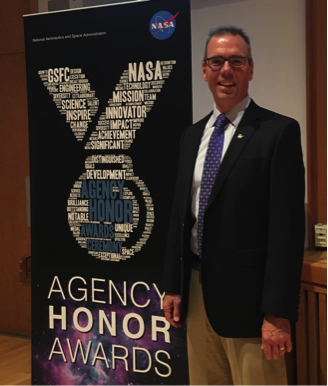
Peter Griffith awarded NASA's Outstanding Public Leadership Medal
Peter Griffith has been awarded NASA’s Outstanding Public Leadership Medal for his leadership supporting NASA's carbon cycle and ecosystems programs. Jeffrey Masek, Chief of the Biospheric Science Laboratory at Goddard Space Flight Center, nominated Peter, saying "Dr. Griffith has played a vital role in coordinating and managing carbon cycle and ecosystems research across NASA, managing logistics for NASA field programs, and in furthering interagency partnerships among NASA, NOAA, DOE, and other partner agencies. In so doing, he has significantly advanced NASA's role within the U.S. Carbon Cycle research community, and enhanced the quality of the science resulting from NASA's investments".
NASA CMS: Coming to a Hyperwall near you.
NASA CMS research will soon be in Hyperwall form. We are currently piloting three CMS modules that will make up a 15-20 presentation on the NASA Hyperwall. The Hyperwall travels all over the world highlighting lots of NASA research and innovation.Each module will highlight specific aspects of CMS research and will be able to be tailored to specific events where the NASA Hyperwall will be showing. Biomass, Atmospheric Flux, and Methane will be the main concepts for the first three modules. As more and more projects begin to develop data products, will expect to see many more modules come online. The first set of NASA CMS Hyperwall modules will be shown at four upcoming events before the end of the year;. COP-22 in Marrakech, the SuperComputer Conference in Salt Lake City, AGU in San Francisco, and at the Science Team Meeting in Boulder. We will show the Hyperwall final videos at the Science Team Meeting.
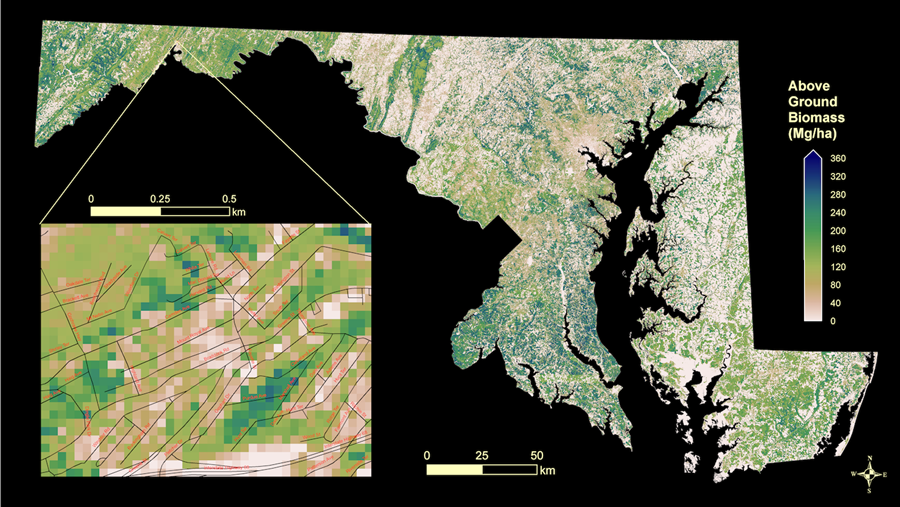
Are you interested in showing your CMS research on the Hyperwall?
Contact David Lagomasino for more information.
Science Team Meeting
From November 14-16, we will be holding the 5th NASA CMS Stakeholder Workshop & Science Team Meeting, in Boulder Colorado. Stakeholders using CMS data products will convene in Boulder, CO during the first day of the CMS Science Team Meeting to discuss the uses, applications and impacts of CMS data products for their organizations. During the Science Team Meeting, all funded projects will report out updates, major findings, and CMS data products. Please see the tentative agenda and goals for the meeting.
- Day 1 Applications Workshop
The 2016 CMS Applications Workshop will present uses and applications of CMS data by Application Readiness Level and identify value and opportunities of CMS applications at each ARL. The goal is to strengthen the relationships between the CMS science team and stakeholders, and to improve upon the CMS science so it is user friendly and impactful to local and international organizations in carbon monitoring and MRV. The workshop will include brief presentations from NASA HQ, CMS scientists and a series of panel discussions charged with identifying actions for helping move CMS science into policy and applications. Stakeholders presenting in the workshop include: the Indonesian Ministry of Environment and Forestry, the Mexican Carbon Program, UNFCCC, U.S. Forest Service, U.S. Environmental Protection Agency (EPA) Climate Change Division, National Institute of Standards and Technology (NIST), Providence City Hall, amongst others. - Day 2-3 Science Team Meeting
- Headquarters and Science Team updates
- 2013 Final Reports in Plenary (12 min talk w/ 3 min questions); posters welcomed.
- 2014 Projects- Posters
- 2016 Projects- Lightning Talks in Plenary (5 min); posters welcomed.
- Working Group meetings and report-out
For the agenda and more details, please visit our meeting website below.
Calendar of Events
Nov 1: Call for Abstracts for 2017 Joint NACP & Ameriflux Principal Investigators Meeting
Nov 7–18: COP-22 | Marrakech, Morocco
Nov 13–18: Super Computing | Salt Lake City, Utah
Nov 14–18: ForestSat | Santiago, Chile
Nov 14–16: NASA CMS Science Team Meeting | Boulder, CO
Nov 30: CMS Lunchtime Policy Speaker Series: Dr. Eleanor Milne will give a remote talk titled: The Carbon Benefits Project (CBP): Tools to estimate the climate change mitigation co-benefits of land management projects, Eleanor Milne, Modeling Component Coordinator for Global Environment Facility's (GEF) Carbon Benefits Project, Colorado State University | NASA GSFC, B33 G133 | 12-1PM
Dec 12–16: AGU Meeting | San Francisco, CA
Tues, Dec 13 08:00 - 12:20
CMS Session ID 13493 convened by George Hurtt–Univ of MD and
Peter Griffith–GSFC/SSAI
GC021 Poster Session: Carbon Monitoring Systems Research and Applications Section/Focus Group: Global Environmental ChangeTues, Dec 13 16:00 - 18:00
CMS Session ID 15586 convened by George Hurtt—Univ of MD and
Peter Griffith—GSFC/SSAI
GC24C Oral Session: Carbon Monitoring Systems Research and Applications II- Thurs, Dec 13 11:30 - 11:45, 3:30 - 3:45:
Hyperwall time slots - View other carbon related sessions
Jan 4, 2017: Talk & Poster Abstracts due for 2017 Joint NACP & Ameriflux Principal Investigators Meeting
Mar 27–30, 2017: The 2017 Joint NACP and AmeriFlux Principal Investigators Meeting | North Bethesda, MD
